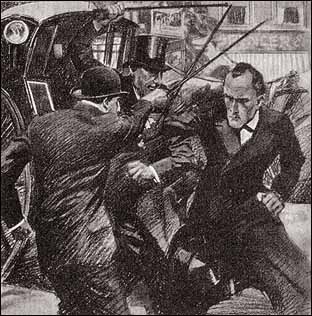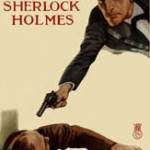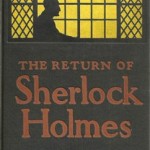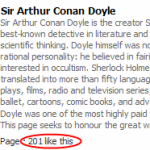I think I stood stunned for some moments. Then I have a confused recollection of snatching at a paper, of the remonstrance of the man, whom I had not paid, and, finally, of standing in the doorway of a chemist’s shop while I turned up the fateful paragraph. This was how it ran:
We learn with regret that Mr. Sherlock Holmes, the well-known private detective, was the victim this morning of a murderous assault which has left him in a precarious position. There are no exact details to hand, but the event seems to have occurred about twelve o’clock in Regent Street, outside the Cafe Royal. The attack was made by two men armed with sticks, and Mr. Holmes was beaten about the head and body, receiving injuries which the doctors describe as most serious. He was carried to Charing Cross Hospital and afterwards insisted upon being taken to his rooms in Baker Street. The miscreants who attacked him appear to have been respectably dressed men, who escaped from the bystanders by passing through the Cafe Royal and out into Glasshouse Street behind it.
No doubt they belonged to that criminal fraternity which has so often had occasion to bewail the activity and ingenuity of the injured man.
I need not say that my eyes had hardly glanced over the paragraph before I had sprung into a hansom and was on my way to Baker Street. I found Sir Leslie Oakshott, the famous surgeon, in the hall and his brougham waiting at the curb.

“No immediate danger,” was his report. “Two lacerated scalp wounds and some considerable bruises. Several stitches have been necessary. Morphine has been injected and quiet is essential, but an interview of a few minutes would not be absolutely forbidden.”
With this permission I stole into the darkened room. The sufferer was wide awake, and I heard my name in a hoarse whisper. The blind was three-quarters down, but one ray of sunlight slanted through and struck the bandaged head of the injured man. A crimson patch had soaked through the white linen compress. I sat beside him and bent my head.
“All right, Watson. Don’t look so scared,” he muttered in a very weak voice. “It’s not as bad as it seems.”
“Thank God for that!”
“I’m a bit of a single-stick expert. as you know. I took most of them on my guard. It was the second man that was too much for me.”
“What can I do, Holmes? Of course, it was that damned fellow who set them on. I’ll go and thrash the hide off him if you give the word.”
“Good old Watson! No, we can do nothing there unless the police lay their hands on the men. But their get-away had been well prepared. We may be sure of that. Wait a little. I have my plans. The first thing is to exaggerate my injuries. They’ll come to you for news. Put it on thick, Watson. Lucky if I live the week out concussion delirium–what you like! You can’t overdo it.”
“But Sir Leslie Oakshott?”
“Oh, he’s all right. He shall see the worst side of me. I’ll look after that.”
“Anything else?”
“Yes. Tell Shinwell Johnson to get that girl out of the way. Those beauties will be after her now. They know, of course, that she was with me in the case. If they dared to do me in it is not likely they will neglect her. That is urgent. Do it to-night.”
“I’ll go now. Anything more?”
“Put my pipe on the table–and the tobacco-slipper. Right! Come in each morning and we will plan our campaign.”
I arranged with Johnson that evening to take Miss Winter to a quiet suburb and see that she lay low until the danger was past.
For six days the public were under the impression that Holmes was at the door of death. The bulletins were very grave and there were sinister paragraphs in the papers. My continual visits assured me that it was not so bad as that. His wiry constitution and his determined will were working wonders. He was recovering fast, and I had suspicions at times that he was really finding himself faster than he pretended even to me. There was a curious secretive streak in the man which led to many dramatic effects, but left even his closest friend guessing as to what his exact plans might be. He pushed to an extreme the axiom that the only safe plotter was he who plotted alone. I was nearer him than anyone else, and yet I was always conscious of the gap between.
On the seventh day the stitches were taken out, in spite of which there was a report of erysipelas in the evening papers. The same evening papers had an announcement which I was bound, sick or well, to carry to my friend. It was simply that among the passengers on the Cunard boat Ruritania, starting from Liverpool on Friday, was the Baron Adelbert Gruner, who had some important financial business to settle in the States before his impending wedding to Miss Violet de Merville, only daughter of, etc., etc. Holmes listened to the news with a cold, concentrated look upon his pale face, which told me that it hit him hard.
“Friday!” he cried. “Only three clear days. I believe the rascal wants to put himself out of danger’s way. But he won’t, Watson! By the Lord Harry, he won’t! Now, Watson, I want you to do something for me.”
“I am here to be used, Holmes.”
“Well, then, spend the next twenty-four hours in an intensive study of Chinese pottery.”
He gave no explanations and I asked for none. By long experience I had learned the wisdom of obedience. But when I had left his room I walked down Baker Street, revolving in my head how on earth I was to carry out so strange an order. Finally I drove to the London Library in St. James’s Square, put the matter to my friend Lomax, the sublibrarian, and departed to my rooms with a goodly volume under my arm.
It is said that the barrister who crams up a case with such care that he can examine an expert witness upon the Monday has forgotten all his forced knowledge before the Saturday. Certainly I should not like now to pose as an authority upon ceramics. And yet all that evening, and all that night with a short interval for rest, and all next morning, I was sucking in knowledge and committing names to memory. There I learned of the hall-marks of the great artist-decorators, of the mystery of cyclical dates, the marks of the Hung-wu and the beauties of the Yung-lo, the writings of Tang-ying, and the glories of the primitive period of the Sung and the Yuan. I was charged with all this information when I called upon Holmes next evening. He was out of bed now, though you would not have guessed it from the published reports, and he sat with his much-bandaged head resting upon his hand in the depth of his favourite armchair.
“Why, Holmes,” I said, “if one believed the papers, you are dying.”
“That,” said he, “is the very impression which I intended to convey. And now, Watson, have you learned your lessons?”
“At least I have tried to.”
“Good. You could keep up an intelligent conversation on the subject?”
“I believe I could.”
“Then hand me that little box from the mantelpiece.”






